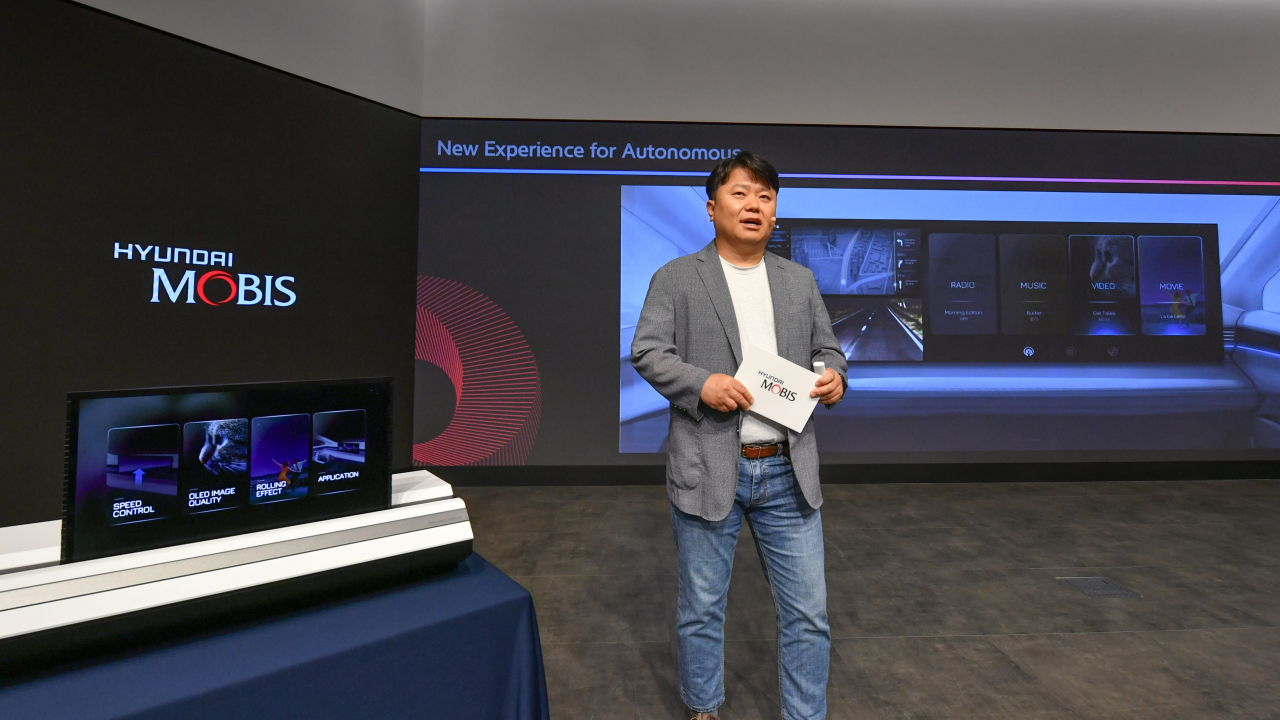 |
Han Young-hoon, vice president of Hyundai Mobis, shows the company's rollable display for vehicles during a media conference held at the firm's R&D center in Yongin, Gyeonggi Province, Monday. (Hyundai Mobis) |
Hyundai Mobis, a South Korean automotive parts maker under Hyundai Motor Group, is seeking to lead the global in-vehicle display market with its rollable and swivel displays.
“Hyundai Mobis is developing various in-vehicle display technologies centered on innovating space, enhancing user satisfaction and securing passenger safety,” said Han Young-hoon, Hyundai Mobis’ vice president heading the Electronics Convenience and Control lab during a media conference held at the company’s technical center in Yongin, Gyeonggi Province, Monday. “We will offer solutions optimized for the future mobility environment.”
Hyundai Mobis demonstrated its rollable and swivel displays to the public for the first time during the media event.
The rollable display, the world’s first technology of an in-vehicle display capable of rolling up and down, offered a glimpse into the interiors of future vehicles. The demonstration showed how the screen can be rolled up to one-third, two-thirds or to its full size from the base depending on the users’ needs.
The 34-inch swivel display, another world first developed by Hyundai Mobis, demonstrated how a changeable curved display featuring 6K high-resolution OLED panels could stretch from the driver’s seat to the passenger’s seat in the front row of a vehicle. The long display had divided sections such as navigation, entertainment and vehicle information.
The auto parts maker also presented a local dimming head-up display, or HUD, highlighting how it can decrease the vehicle’s power consumption by 75 percent on average. It also offers drivers a wider field of view with high image quality.
Based on these next-generation display technologies, Hyundai Mobis pledged to begin full-fledged marketing activities to attract automakers and win orders moving forward. The company’s goal this year is to secure overseas core parts orders worth $5.35 billion. Of them, Hyundai Mobis said the target for electronic parts including in-vehicle display products is $1.83 billion. Hyundai Mobis scored a total of $4.65 billion from overseas core parts orders in 2022.
Hyundai Mobis added that it plans to develop a passenger interactive display, quantum-dot mini LED display, natural 3D display, hologram augmented reality HUD and micro LED to lead the future in-vehicle display market. According to market analyzer Display Supply Chain Consultants, the global in-vehicle display market is projected to increase to $14 billion in 2027 from $9 billion this year.
In accordance with the future mobility industry led by the rise of software-defined vehicles, the auto parts maker said it will come up with expandable software solutions that can provide more infotainment services such as playing games and watching sports and over-the-top content in cars.
Hyundai Mobis also hinted at where the company’s focus will be in regard to what will be next for in-vehicle display technologies in the long term.
“Once we reach the era of completely autonomous driving, the in-vehicle display will be maximized, and the windshield could be used as a transparent display if needed,” said Han.
“Ultimately, (a HUD) will cover the entire windshield and play the role of maximizing in-vehicle space by being able to change its size mechanically. So in the future, the windshield will turn into a display and (an augmented reality HUD) will cover every focal point.”







![[Today’s K-pop] Blackpink’s Jennie, Lisa invited to Coachella as solo acts](http://res.heraldm.com/phpwas/restmb_idxmake.php?idx=644&simg=/content/image/2024/11/21/20241121050099_0.jpg)